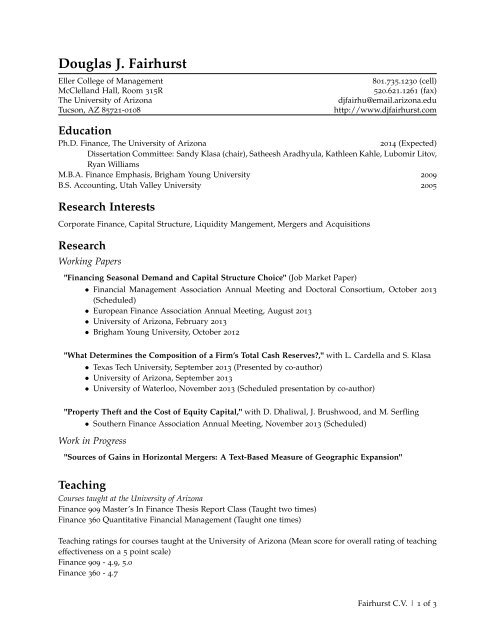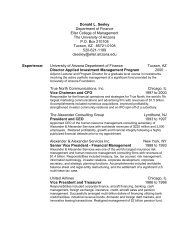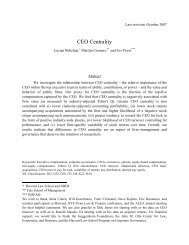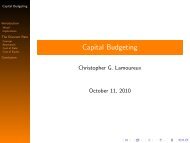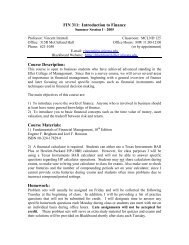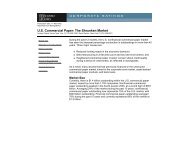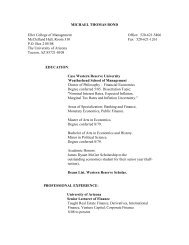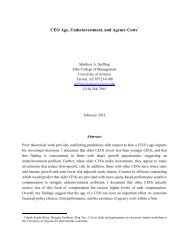Douglas J. Fairhurst: Curriculum Vitae - Department of Finance
Douglas J. Fairhurst: Curriculum Vitae - Department of Finance
Douglas J. Fairhurst: Curriculum Vitae - Department of Finance
Create successful ePaper yourself
Turn your PDF publications into a flip-book with our unique Google optimized e-Paper software.
<strong>Douglas</strong> J. <strong>Fairhurst</strong><br />
Eller College <strong>of</strong> Management<br />
McClelland Hall, Room 315R<br />
The University <strong>of</strong> Arizona<br />
Tucson, AZ 85721-0108<br />
801.735.1230 (cell)<br />
520.621.1261 (fax)<br />
djfairhu@email.arizona.edu<br />
http://www.djfairhurst.com<br />
Education<br />
Ph.D. <strong>Finance</strong>, The University <strong>of</strong> Arizona<br />
2014 (Expected)<br />
Dissertation Committee: Sandy Klasa (chair), Satheesh Aradhyula, Kathleen Kahle, Lubomir Litov,<br />
Ryan Williams<br />
M.B.A. <strong>Finance</strong> Emphasis, Brigham Young University 2009<br />
B.S. Accounting, Utah Valley University 2005<br />
Research Interests<br />
Corporate <strong>Finance</strong>, Capital Structure, Liquidity Mangement, Mergers and Acquisitions<br />
Research<br />
Working Papers<br />
"Financing Seasonal Demand and Capital Structure Choice" (Job Market Paper)<br />
• Financial Management Association Annual Meeting and Doctoral Consortium, October 2013<br />
(Scheduled)<br />
• European <strong>Finance</strong> Association Annual Meeting, August 2013<br />
• University <strong>of</strong> Arizona, February 2013<br />
• Brigham Young University, October 2012<br />
"What Determines the Composition <strong>of</strong> a Firm’s Total Cash Reserves," with L. Cardella and S. Klasa<br />
• Texas Tech University, September 2013 (Presented by co-author)<br />
• University <strong>of</strong> Arizona, September 2013<br />
• University <strong>of</strong> Waterloo, November 2013 (Scheduled presentation by co-author)<br />
"Property Theft and the Cost <strong>of</strong> Equity Capital," with D. Dhaliwal, J. Brushwood, and M. Serfling<br />
• Southern <strong>Finance</strong> Association Annual Meeting, November 2013 (Scheduled)<br />
Work in Progress<br />
"Sources <strong>of</strong> Gains in Horizontal Mergers: A Text-Based Measure <strong>of</strong> Geographic Expansion"<br />
Teaching<br />
Courses taught at the University <strong>of</strong> Arizona<br />
<strong>Finance</strong> 909 Master’s In <strong>Finance</strong> Thesis Report Class (Taught two times)<br />
<strong>Finance</strong> 360 Quantitative Financial Management (Taught one times)<br />
Teaching ratings for courses taught at the University <strong>of</strong> Arizona (Mean score for overall rating <strong>of</strong> teaching<br />
effectiveness on a 5 point scale)<br />
<strong>Finance</strong> 909 - 4.9, 5.0<br />
<strong>Finance</strong> 360 - 4.7<br />
<strong>Fairhurst</strong> C.V. | 1 <strong>of</strong> 3
Awards, Fellowships, & Grants<br />
Selected participant for FMA Doctoral Student Consortium 2013<br />
Conference Travel Grant - American <strong>Finance</strong> Association Meetings, Chicago, IL 2012<br />
University <strong>of</strong> Arizona GSPC Travel Grant Award 2012, 2013<br />
U <strong>of</strong> A Graduate Assistant Fellowship<br />
2009-present<br />
Conference Participation<br />
Presenter - Southern <strong>Finance</strong> Association Annual Meeting, Fajardo, Puerto Rico** Nov, 2013<br />
Discussant - Southern <strong>Finance</strong> Association Annual Meeting, Fajardo, Puerto Rico** Nov, 2013<br />
Presenter - Financial Management Annual Meeting, Chicaco, IL** Oct, 2013<br />
Presenter - European <strong>Finance</strong> Association Annual Meeting, Cambridge, UK Aug, 2013<br />
Discussant - Financial Management Association Annual Meeting, Atlanta, GA Oct, 2012<br />
Attendee - American <strong>Finance</strong> Association Annual Meeting, Chicago, IL Jan, 2012<br />
**Denotes scheduled conference participation<br />
Service<br />
University <strong>of</strong> Arizona PhD Student Seminar Organizer/Originator 2010-2013<br />
Reviewer - Midwest <strong>Finance</strong> Association Annual Meeting 2013<br />
Pr<strong>of</strong>essional Experience<br />
United Rentals, Inc., Senior Financial Analyst 2008<br />
Utah State Tax Commission, Tax Auditor 2005-2007<br />
Premier Administration, LLC, Trust Accountant 2004-2005<br />
Pr<strong>of</strong>essional Memberships<br />
American <strong>Finance</strong> Association<br />
Financial Management Association<br />
References<br />
European <strong>Finance</strong> Association<br />
Southern <strong>Finance</strong> Association<br />
Sandy Klasa, Ph.D.<br />
Kathleen Kahle, Ph.D.<br />
Anheuser-Busch Endowed Chair<br />
Associate Pr<strong>of</strong>essor<br />
Associate Pr<strong>of</strong>essor<br />
<strong>Department</strong> <strong>of</strong> <strong>Finance</strong><br />
<strong>Department</strong> <strong>of</strong> <strong>Finance</strong><br />
University <strong>of</strong> Arizona<br />
University <strong>of</strong> Arizona<br />
1130 E. Helen Street<br />
1130 E. Helen Street Tucson, AZ 85721-0108<br />
Tucson, AZ 85721-0108 Phone: 520.621.7489<br />
Phone: 520.621.8761<br />
kkahle@email.arizona.edu<br />
sklasa@email.arizona.edu<br />
Lubomir Litov, Ph.D.<br />
Ryan Williams Ph.D<br />
Assistant Pr<strong>of</strong>essor<br />
Assistant Pr<strong>of</strong>essor<br />
<strong>Department</strong> <strong>of</strong> <strong>Finance</strong><br />
<strong>Department</strong> <strong>of</strong> <strong>Finance</strong><br />
University <strong>of</strong> Arizona<br />
University <strong>of</strong> Arizona<br />
1130 E. Helen Street 1130 E. Helen Street<br />
Tucson, AZ 85721-0108 Tucson, AZ 85721-0108<br />
Phone: 520.621.3794 Phone: 520.621.2852<br />
litov@eller.arizona.edu<br />
rwilliams@eller.arizona.edu<br />
<strong>Fairhurst</strong> C.V. | 2 <strong>of</strong> 3
Detailed Summary <strong>of</strong> Working Papers<br />
"Financing Seasonal Demand and Capital Structure Choice" (Job Market Paper)<br />
Firms that face seasonal demand account for an important fraction <strong>of</strong> the U.S. economy. However, there<br />
is surprisingly little evidence on these firms’ financing and capital structure decisions. Yet, studying these<br />
decisions provides a unique setting to shed light on theoretical motivations for capital structure choice.<br />
Consistent with pecking order and financial flexibility models <strong>of</strong> capital structure choice, I show that<br />
seasonal investment needs are financed with debt that has low exposure to information asymmetries, such<br />
as short-term debt and trade credit. However, supporting flexibility but not pecking order predictions, I<br />
find that cash holdings are not used to finance seasonal investment. I also document that seasonal firms,<br />
which return to the capital markets frequently for seasonal short-term debt, hold less total debt and have<br />
long-term debt with a longer average maturity, which is additional support for flexibility theory. Finally,<br />
consistent with flexibility predictions, I show that seasonal firms adjust toward target leverage ratios at a<br />
slower rate during quarters when seasonal investment needs are highest. Overall, I conclude that seasonal<br />
firms’ financing and capital structure decisions can be explained by the financial flexibility model <strong>of</strong> capital<br />
structure choice.<br />
"What Determines the Composition <strong>of</strong> a Firm’s Total Cash Reserves," with Laura Cardella and Sandy<br />
Klasa<br />
We document that there is significant cross-sectional variation in the liquid assets that make up firms’ cash<br />
reserves. This variation can best be explained in the context <strong>of</strong> firms optimally trading <strong>of</strong>f the benefits <strong>of</strong><br />
investing in financial assets that earn a higher yield, with the larger transaction costs and additional risk<br />
<strong>of</strong> these assets. We also find evidence that suggests in poorly governed firms, managers prefer to hold<br />
most <strong>of</strong> their firm’s cash reserves in highly liquid financial assets that earn shareholders a lower yield<br />
so they can more easily spend these reserves on self-serving projects. Overall, our findings imply that<br />
firms’ choices with respect to the financial assets in which they invest their cash reserves is an important<br />
component <strong>of</strong> corporate liquidity management practices.<br />
"Property Theft and the Cost <strong>of</strong> Equity Capital," with Dan Dhaliwal, James Brushwood, and Matthew<br />
Serfling<br />
Although prior work suggests that a firm’s business risk has a substantial impact on its cost <strong>of</strong> equity<br />
capital, there is little evidence identifying these sources <strong>of</strong> risk. A large and overlooked source <strong>of</strong> business<br />
risk that costs firms and investors billions <strong>of</strong> dollars annually arises from firms’ exposure to property theft.<br />
Based on arguments linking a firm’s exposure to property theft to non-diversifiable cash flow effects, we<br />
hypothesize that a rise in a firm’s exposure to property theft will increase the firm’s cost <strong>of</strong> equity capital.<br />
We test our hypothesis using changes in state-level property crime rates as a source <strong>of</strong> variation in a<br />
firm’s exposure to property theft. Consistent with our hypothesis, we find that a rise in property crime<br />
rates increases a firm’s cost <strong>of</strong> equity capital through increased systematic risk. Further, omitted variables<br />
related to overall criminal activity, local economic conditions, and labor market characteristics do not drive<br />
this finding. Finally, the impact <strong>of</strong> property theft on firms’ cost <strong>of</strong> equity capital is more pronounced when<br />
individuals have greater incentives and opportunities to steal from firms. Overall, our paper shows that<br />
business risk arising from exposure to property theft impacts firms’ financing costs.<br />
Last updated: September 11, 2013<br />
<strong>Fairhurst</strong> C.V. | 3 <strong>of</strong> 3


